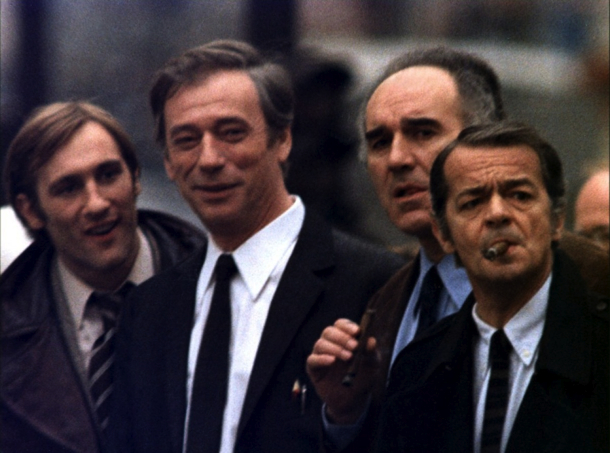




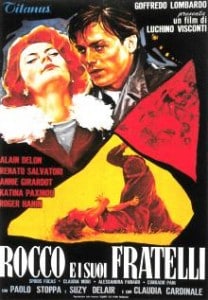 Melancholy: deep and impenetrable sadness – a retrograde state of mind. The unknown and unseen past has swallowed up present and future. The heroes and heroines of melancholic films are aware of this: from the moment they appear on the screen for the first time, we know it’s all over before a word is said. The ensuing narrative is just there to underline their fate: whilst choosing a new love, a new beginning, they really want to end it all. They are lovers of loss and being lost – and we love them for it.
Melancholy: deep and impenetrable sadness – a retrograde state of mind. The unknown and unseen past has swallowed up present and future. The heroes and heroines of melancholic films are aware of this: from the moment they appear on the screen for the first time, we know it’s all over before a word is said. The ensuing narrative is just there to underline their fate: whilst choosing a new love, a new beginning, they really want to end it all. They are lovers of loss and being lost – and we love them for it.
Luchino Visconti is a favourite director for one main reason: he was able to make successful movies in the neo-realist tradition (ROCCO AND HIS BROTHERS (1960), as well as operatic masterpieces that were always anchored in the past, like THE LEOPARD (1963).
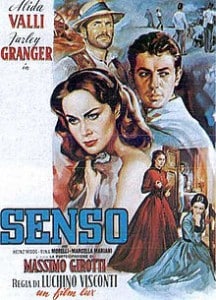 I could have easily chosen LUDWIG (1972) or L’innocente (1976) – but I went for SENSO (1954), because Alida Valli’s beautiful Countess Serpieri really wants to destroy herself – throwing everything away for an unscrupulous man – whose true character she knows the moment she sets eyes on him for the first time in a Venice theatre in 1866, whilst Italian patriots, fighting the Austrian occupying forces, throw leaflets from the balconies. In the ensuing fighting, Duke Ussoni, a leader of the rebels, hurts one of the Austrian soldiers, Lt. Franz Mahler (Farley Granger). To save Ussoni, Countess Serpieri, whose husband is fighting for the Austrians at the front, tries to talk Mahler out of making a formal complaint – only to fall madly in love with this most superficial, opportunistic coward. He soon asks the Countess for money, to buy himself out of the army. She obliges, stealing money from the fund of the rebels, which Ussoni had entrusted her with. But Mahler disappears, drinking and whoring the money away. When she finds him with another woman, she goes to the authorities, denounces him and watches his execution – only to go mad, shouting his name in the dark streets.
I could have easily chosen LUDWIG (1972) or L’innocente (1976) – but I went for SENSO (1954), because Alida Valli’s beautiful Countess Serpieri really wants to destroy herself – throwing everything away for an unscrupulous man – whose true character she knows the moment she sets eyes on him for the first time in a Venice theatre in 1866, whilst Italian patriots, fighting the Austrian occupying forces, throw leaflets from the balconies. In the ensuing fighting, Duke Ussoni, a leader of the rebels, hurts one of the Austrian soldiers, Lt. Franz Mahler (Farley Granger). To save Ussoni, Countess Serpieri, whose husband is fighting for the Austrians at the front, tries to talk Mahler out of making a formal complaint – only to fall madly in love with this most superficial, opportunistic coward. He soon asks the Countess for money, to buy himself out of the army. She obliges, stealing money from the fund of the rebels, which Ussoni had entrusted her with. But Mahler disappears, drinking and whoring the money away. When she finds him with another woman, she goes to the authorities, denounces him and watches his execution – only to go mad, shouting his name in the dark streets.
[youtube id=”vn07l1MQG64″ width=”600″ height=”350″]
In betraying her class and her country, she denounces herself and her past. Since Mahler never tried very hard to conceal his duplicity why does Serpieri want him so much; his good looks can’t be the only reason. The Countess does not love her husband, and sees him as a traitor: he has joined the rebels for romantic, not political reasons, hoping to escape her role in the aristocracy, which does not give her much personal freedom. At the same time, she wants to punish herself for her thoughts, and in eloping with Mahler, she commits the ultimate treason against herself. Alida Valli carries the film, floating through the attractive landscapes and palaces, always on the outlook for death, her death, whilst pretending to free herself via a love, which she only knows too well, does not exist. In the end she is executioner and victim: alive, but in a world by herself.
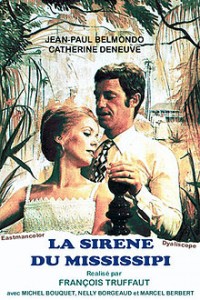 Superficially looked at, Francois Truffaut’s MISSISSIPPI MERMAID (LA SIRENE DU MISSISSIPPI) from 1969 is just another B-movie in colour. Based on the novel “Waltz into Darkness” by Cornel Woolrich (aka William Irish), whose “The Bride wore Black” Truffaut had filmed in 1967 with Jeanne Moreau in the title role. MERMAID (dedicated to Renoir) opens in Reunion, where Louis Mahe (J.P. Belmondo), a rich owner of a tobacco plantation, is expecting his mail order bride, Julie Roussel. But the woman who arrives at the pier is anything but the plain, straight Roussel: Marion Bergamo (Catherine Deneuve) is an outstanding beauty – and femme fatale. She and her co-conspirator have killed Roussel on the ship so Bergamo can marry Mahe – and his money. Like Serpieri in Senso, one look for Mahe is enough to fall in love with Marion. Even when she steals his money and disappears to Nice, where he follows her, his love is stronger than his resentment. Marion, whose partner in crime has taken all the money, is working in a bar, hotly pursued by a detective hired by Roussel’s sister. He finds the couple, and Mahe shoots him. On the run through the Swiss Alps, with his money running out, Marion tries to poison Mahe, but he still forgives her. His ‘amour fou’ knows no boundaries, as the couple stumbles through the snow into unknown future.
Superficially looked at, Francois Truffaut’s MISSISSIPPI MERMAID (LA SIRENE DU MISSISSIPPI) from 1969 is just another B-movie in colour. Based on the novel “Waltz into Darkness” by Cornel Woolrich (aka William Irish), whose “The Bride wore Black” Truffaut had filmed in 1967 with Jeanne Moreau in the title role. MERMAID (dedicated to Renoir) opens in Reunion, where Louis Mahe (J.P. Belmondo), a rich owner of a tobacco plantation, is expecting his mail order bride, Julie Roussel. But the woman who arrives at the pier is anything but the plain, straight Roussel: Marion Bergamo (Catherine Deneuve) is an outstanding beauty – and femme fatale. She and her co-conspirator have killed Roussel on the ship so Bergamo can marry Mahe – and his money. Like Serpieri in Senso, one look for Mahe is enough to fall in love with Marion. Even when she steals his money and disappears to Nice, where he follows her, his love is stronger than his resentment. Marion, whose partner in crime has taken all the money, is working in a bar, hotly pursued by a detective hired by Roussel’s sister. He finds the couple, and Mahe shoots him. On the run through the Swiss Alps, with his money running out, Marion tries to poison Mahe, but he still forgives her. His ‘amour fou’ knows no boundaries, as the couple stumbles through the snow into unknown future.
[youtube id=”JK-XbZYy0-E” width=”600″ height=”350″]
Mermaid is a more contemporary version of THE BLUE ANGEL, where the ageing teacher Rath gives everything up for Dietrich’s Lola. But Rath returns in the end to his school, wanting to go back to his past, whilst Belmondo/Mahe takes his self destruction many steps further: he kills for Marion, gives her the rest of his money, is even ready to die by her own hand – he just wants to be with her. Love Colder than Death, ironically the title of Fassbinder’s first feature, is the Leitmotiv of Mermaid. Mahe is also in love with his masochism; he thrives in poverty more than in the splendour of his Reunion home. His loneliness is the key to his downfall: all the material grandeur of his wealth means nothing to him – he wants to be loved, by anyone. And since he has had no experience with women, he falls for the first one he meets. The attraction here again is not so much the attractiveness of the partner, but the way to an end she symbolises. She is ‘Lady Macbeth’, but he is much more than a willing slayer: he wants to die with her all the time, his will to live is much weaker than hers, with infuriates her; but in the end, she seems to capitulate to his meekness and self destructive love.
[youtube id=”OPC2PYzk10E” width=”600″ height=”350″]
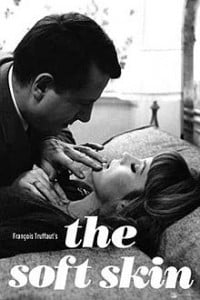 Like with Visconti, there are any number of films by Truffaut I could have chosen to embody this theme. And since a real melancholic film should be in black and white, I have opted for LA PEU DOUCE from 1963. Pierre Lachenay (Jean Desailly) is the publisher of a small literary magazine in Paris. He is married to Franca (Nelly Benedetti), the couple has a daughter. Lachenay is rather self -centred and takes his family for granted, pursuing his career with great eagerness. On a flight to Lisbon he meets the much younger stewardess Nicole (Francoise Dorleac), and falls hopelessly in love with her. But as soon as he has conquered her, he becomes possessive. Nicole soon looses interest in him, his middle-aged seriousness and obsession with cultural niceties does not go well with her more carefree, but sensual personality. He wants to put her into a golden cage, shows her a flat he wants to buy for her. This is the last straw for Nichole, she tells him that she is leaving him. In a parallel montage after this rejection, we see Lachenay trying to phone his wife Franca, wanting to tell her that he will stay with her after all, but she has just left the house, and taken the car to drive to his favourite restaurant, where she shoots him. The last shot shows Franca sitting on the floor, looking up at her dead husband, smiling not ruefully, but rather like the cat who got the cream.
Like with Visconti, there are any number of films by Truffaut I could have chosen to embody this theme. And since a real melancholic film should be in black and white, I have opted for LA PEU DOUCE from 1963. Pierre Lachenay (Jean Desailly) is the publisher of a small literary magazine in Paris. He is married to Franca (Nelly Benedetti), the couple has a daughter. Lachenay is rather self -centred and takes his family for granted, pursuing his career with great eagerness. On a flight to Lisbon he meets the much younger stewardess Nicole (Francoise Dorleac), and falls hopelessly in love with her. But as soon as he has conquered her, he becomes possessive. Nicole soon looses interest in him, his middle-aged seriousness and obsession with cultural niceties does not go well with her more carefree, but sensual personality. He wants to put her into a golden cage, shows her a flat he wants to buy for her. This is the last straw for Nichole, she tells him that she is leaving him. In a parallel montage after this rejection, we see Lachenay trying to phone his wife Franca, wanting to tell her that he will stay with her after all, but she has just left the house, and taken the car to drive to his favourite restaurant, where she shoots him. The last shot shows Franca sitting on the floor, looking up at her dead husband, smiling not ruefully, but rather like the cat who got the cream.
[youtube id=”MYZj9Jzf6kI” width=”600″ height=”350″]
Lachenay is, unlike Serpieri and Mahe, not hell bent on self-destruction. But he wants a new beginning, on his terms though: he does not want to scarify his bourgeois identity, which means putting his job first and staying in control. But he really loves Nicole, and by offering her a new home, he hopes to receive gratitude for raising her to his own level. But Nichole does not want material gratification, she wants to be loved for herself. Her interaction with the stray kitten in the provincial motel shows her as a pure person, who wants simple harmony and no trappings, materially or status wise. She wants to communicate direct, a free spirit of ’68. Unlike Lachenay, who uses telephones all the time to postpone meetings and decisions. But in spite of all, we feel for Lachenay, see him struggle with his sedateness, not so much like an old man, but like a little boy, aged before his time. In the end he is destroyed between two much stronger women: one young and down to earth, the other more of his own class, but much more decisive than himself. When we see him dead at his table, we feel pity, because the task of reconciling his old personality with his new love was simply too much for him. AS
AVAILABLE ON BLURAY/DVD AT AMAZON.CO.UK